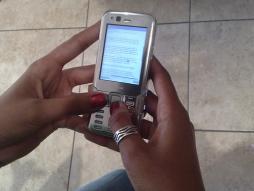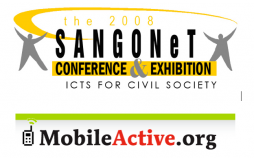mobiles for development
Posted by kelechiea on Jun 28, 2011
Mobilizing Development: The UN Foundation and Vodafone Foundation Technology Partnership data sheet 1205 Views
Author:
Vodafone Foundation, United Nations Foundation
Abstract:
This report takes a journalistic rather than an academic approach. It aims to pique interest, provoke debate, and explore the ideas that emerged from a groundbreaking relationship. It also hopes both to accentuate the Technology Partnership’s many positive results while providing a sense of self-reflection that might benefit other potential partnerships.
Over half a decade of experimentation, the Technology Partnership encountered many challenges and saw a variety of outcomes – some successful, others less so. Some of those outcomes might have been improved by different design, but many were also an unavoidable consequence of a complex world of many players and the fast rate of
technological change.
What emerges clearly, however, is a moment of extraordinary and continued opportunity in which both the humanism of the UN and the action-oriented culture of the private sector will be essential. The potential of this cross-sector collaboration is demonstrated by the work of the UN Foundation and Vodafone Foundation. Public-private alliances of this kind require sacrifice and hard work but promise a significant boost to global efforts to improve human wellbeing.
Posted by MelissaUlbricht on Nov 10, 2010
Today at noon PST, Kentaro Toyama will give a talk from UC Berkeley on Ten Myths of ICT for International Development, a topic dear to our hearts as we continue to demystify mobile technology for social change.
A live broadcast is available here. Questions can be sent via Yahoo IM to username: citrisevents.
The Center for Information Technology Research in the Interest of Society summarizes the event here:
The past decade has seen incredible interest in applying information and communication technologies for international development, an endeavor often abbreviated "ICT4D." Can mobile phones be used to improve rural healthcare? How do you design user interfaces for an illiterate migrant worker? What value is technology to a farmer earning $1 a day?
Posted by AnneryanHeatwole on Oct 13, 2010
Since MobileActive.org was founded five years ago, this community has grown tremendously. We wanted to know from you - the insightful, smart, and innovative community - what’s been helpful, what you want and need, and what we should be doing more (or less) of.
With 5 billion mobile subscriptions worldwide and NGOs large and small adopting mobile tech in their work, and with governments jumping on board as well, this seems to be the year where we collectively broke through an adoption barrier.
In a quick word cloud of responses, mobiles, obviously, were the greatest topic of discussion, but "people," "work," "technology," "information," and "community" made strong showings as well. (We like that people was the second-most used word!)
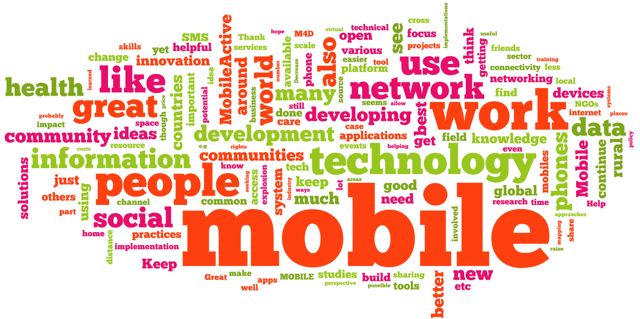
Three Questions. Many Answers
Our first question focused on where we’ve been, asking: “What are the two most important changes that you have seen in the field of mobile tech for social impact over the last five years?”
| The MobileActive.org Community: What You Said data sheet 2314 Views |
| Countries: |
United States
|
Posted by anoushrima on Sep 23, 2010
In late September 2005, a group of 40 innovators and activists who were exploring the socially beneficial applications for mobile phones as more than just a personal communication device, convened in Toronto for a 3-day meeting.
From that meeting, MobileActive.org was born.
Today, five years later, MobileActive.org is a growing international digital community of 20,000 highly skilled practitioners, technologists, campaigners and strategists like you.
In 2005 there were just over 1.5 billion mobile subscriptions worldwide. Today, we have already cleared the 5 billion mark. And thanks to the visionary work of the people in this community, the idea of leveraging mobile technology to improve people’s lives, is at top of mind.
Posted by ithorpe on Apr 16, 2010
On Wednesday evening I was lucky enough to attend the first ever "Failfaire", organized by MobileActive.org where several brave souls agreed to present their failed "Information Technology for Development" projects, explaining why they failed and what they learned from them.
I work on knowledge management in UNICEF, and have a strong interest in improving how we learn from our experience. This event (which was certainly not a failure!) was interesting to our work from at least two points of view:
1. The lessons learned from the projects themselves
2. The idea for the event itself and whether this might be something we could try ourselves.
There were four presentations during the meeting:
Bradford Frost presented on Mobileimpact.org a project to recycle old cellphones and donate them to Africa.
Posted by AnneryanHeatwole on Mar 22, 2010
Calling all failures! On April 14 we're hosting the first FAILfaire featuring a close look at ICT and mobile development projects that have crashed, burned, and simply FAILED.
While we often focus on highlighting successes and gains in this field, it's no secret that many projects just don't work - some aren't scalable, some aren't sustainable, some can't get around bureaucratic hoops, and many fail due to completely unanticipated barriers. FAILfaire is a platform to openly and honestly discuss failures so that we can learn from what hasn't worked in the past in order to make our future projects stronger and better.
This is where YOU come in. Have you been a part of a project that flopped? Maybe the project used the wrong technology for its region. Maybe it didn't engage the intended community. Did not take culture, people, or both into consieration. Or maybe the rollout was too rushed. Whatever the reason, we want to hear from you.
| Presenting the First-Ever FAILfaire: Join Us! data sheet 4334 Views |
| Countries: |
United States
|
Posted by AnneryanHeatwole on Nov 02, 2009
Harnessing the Mobile Revolution data sheet 2812 Views
Abstract:
The premise of this paper is that the explosive growth of mobile communications can be a powerful tool for addressing some of the most critical challenges of the 21st century, such as promoting vibrant democracies, fostering inclusive economic growth, and reducing the huge inequities in life expectancy between rich and poor nations.
The benefits of mobile communications are particularly profound for developing countries, many of which are “leapfrogging” the traditional fixed telecommunications infrastructure. As a result, billions of people in developing countries are gaining access to modern communications of any sort for the first time. There is no doubt that mobile communications are having a significant impact on the way Americans live, work and communicate with each other.
But the impact is no doubt more keenly felt by the African mother who can call ahead to determine whether a doctor is available to treat her sick child before traveling for hours. Obviously, mobile communications are not a panacea for the daunting challenges faced by the 2.7 billion people who live on less than $2 a day. Like any new technology, it has costs and risks as well as benefits, and some of the promised benefits will undoubtedly fail to materialize. It’s worth remembering that 19th century pundits thought the telegraph would inevitably lead to world peace, or that in 1922 Thomas Edison predicted the motion picture would “revolutionize our educational system … and supplant largely, if not entirely, the use of textbooks.”
But Columbia University’s Jeffrey Sachs may well be right when he concludes that “the cell phone is the single most transformative technology for development. With a few exceptions, the U.S. government is largely oblivious to the ways in which the rapid diffusion of mobile services (and other new technologies) could be used to improve the human condition. I believe that the next Administration should launch a major new initiative to harness the confluence of new technologies and innovative business models as a key component of its global development agenda. This initiative would be designed to serve as a catalyst for policy reforms in developing countries, promote an increased capacity for innovation by developing country entrepreneurs to meet local needs, and stimulate additional investments by philanthropists, foundations and companies. Such an initiative could reduce poverty, strengthen democratic institutions, and improve global health outcomes. It could also help restore some of the damage to America’s international reputation, boost America’s “soft power,” and position American businesses and workers to benefit from the growth of emerging markets in Africa, Asia, and Latin America.
This initiative would not be limited to mobile services, and might also include decentralized approaches to providing safe drinking water, new vaccines, therapies, point-of-care diagnostics, clean energy, and improved crops that are more productive, nutritious, and drought-resistant. Obviously, private sector investment in mobile communications for developing country markets will continue to grow. Even in the absence of enlightened U.S. government leadership, mobile services will become more ubiquitous, affordable, and versatile. But the missed opportunity will be the failure to leverage this large and growing private sector investment for public purposes, such as ensuring fair elections, helping a community health worker save the life of a mother or young child, or giving a farmer or small business owner access to the credit they need to build a path out of poverty.
Posted by admin on Sep 28, 2009
Essay by Ethan Zuckerman in response to A Dialogue on ICTs, Human Development, Growth, and Poverty Reduction, first published on Publius.cc
If we imagine Washington Irving's Rip Van Winkle falling asleep in a developing nation in 1998 and awaking today, it's likely that he'd be fascinated and surprised by mobile phones. When Rip went to sleep, only a few hundred million people had access to mobile phones, and most lived in wealthy nations. A decade later, the ITU sees 4.1 billion mobile phone accounts, two-thirds of them in the developing world. The changes brought by mobile phones are both subtle and omnipresent - mobile phone numbers painted above shop doors allow merchants to untether from their stalls; carpentry ads scrawled on road signs turn a craftsman with a phone into an independent, mobile business; secure money transfers from abroad pay the village school fees that grant a child an education.
The rise of the mobile phone has challenged many of the predictions about information in the developing world offered by information and communication technology for development (ICT4D) specialists. Instead of embracing community solutions that offered shared access to information, many poor people have been willing to pay large sums (as Steve Song and others have documented, sometimes more than 50% of their disposable income) for personal access to communication tools. Presented with a model that extends connectivity into some poor communities without government subsidy, often turning a profit, the development community is rightly looking for ways to build tools for economic and community development on top of these platforms.
While we are wise to embrace the successes of the mobile phone platform, we need to think carefully about the implications of a mobile-based communications future in the developing world. Much of the thinking about ICT4D has focused on the benefits of the internet, an open, decentralized platform that's different from mobile phone networks in critical ways. It's unclear that some of the emergent behaviors we've celebrated on the Internet can be easily replicated in a mobile-centric world.
Posted by MelissaLoudon on May 27, 2009
At the turn of millennium, tech journalists (clawing their way back from the Y2k=K non-disaster) found smartphones. Futuristic interfaces, newly-discovered mobility and the work-anywhere promise of the Blackberry kicked off the trend, later boosted by the emergence of high-speed mobile Internet and a new crop of Internet-enabled devices. Market figures are for smartphones are certainly impressive, with Gartner recording device sales of 139.4 million in 2008, up 13.9% from 2007.
That same year, the meteoric rise of the iPhone gave us the ability to purchase third-party smartphone applications through the App Store which became a major selling point for the hardware. In the first quarter of 2009, smartphone sales represented 13.5% of mobile phone sales worldwide. Sales show no sign of slowing, and neither does the blistering pace of innovation in hardware, interfaces and 'ecosystems' like the App Store.
Posted by KatrinVerclas on May 26, 2009
We are proud and happy that six months of hard work have paid off - the Open Mobile Consortium has launched officially today. Conceived at MobileActive08 in South Africa, the OMC is featuring a suite of fully open source mobile applications focused on health and humanitarian work. The OMC is an unprecedented collaboration amongst nine high-profile organizations to develop an interopable set of platforms of high-quality open source mobile tools for humanitarian and civil society work.
Here is our press release:
New York, NY – May 26, 2009 – The Open Mobile Consortium today launched its global development community to help organizations working towards social good to better collaborate and share mobile phone-based technologies. The OMC’s open source software tools help organizations to better serve the health, humanitarian and development needs of the “bottom billion,” the poorest and most disenfranchised citizens of the world.
Posted by Ben Colmery on Mar 09, 2009
MobileActive's Mobile Tech 4 Social Change barcamp was the first event of this sort that I have been to. I've never experienced this style of event planning where you pick a theme, arrange a place, invite a bunch of people to come and then let them decide what the sessions would be that day. I have to say, there are elements to it that I really liked, and things I might do differently.
If you'd like to read more about my thoughts on barcamp style conferencing, check out the extended version of this post at The Morningside Post. In the meantime, here are my experiences at the sessions i went to.
FIRST SESSION - UNICEF's Rapid SMS Projects
Posted by KatrinVerclas on Jan 26, 2009
The ongoing debate over the value of cheap and open laptops for users in developing countries as opposed to mobile phones continues, most recently with a post from Cory Doctorow in the Guardian UK. The One Laptop Per Child (OLPC) initiative, the most visible and audacious of the low-cost laptop projects, has been in the news recently for cutting half its staff and severely scaling back and refocusing its operations. OLPC had originally promised to promote economic development by distributing free computers to two billion children in developing countries.
Doctorow in the Guardian argues what we all believe in -- that information technology is an essential ingredient to economic development. He notes:
Posted by KatrinVerclas on Dec 22, 2008
There is a fascinating discussion about the fuure of mobile apps going on over at Change.org. Nathanial Whittemore started it all with a hopeful and visionary blog post on how mobiles will be changing the world. The discussion thread turned into a thoughtful discussion on mobile appplications and how this emerging eco-system of tools scales and interoperates to maximize resources.
Isaac Holeman, working on (and twittering about) MobilizeMRS, points out that "interoperability is a very important point..where it's not necessary for any one installation of anything to scale completely because data can move into or out of any system. Mobile health stuff is so new that interoperability of medical data has hardly been considered, to my knowledge. With MobilizeMRS, one of the primary reasons we want to interface with medical records systems is that a huge amount of work has already been done to promote medical record interoperability with standards such as HL7."
Posted by KatrinVerclas on Dec 16, 2008
Jonathan Donner, Kentaro Toyama, and I recently wrote a paper -- "Reflections on the M4D Landscape" -- in which we critically examine the current diversity of projects and approaches in M4D.
We identify four common choices facing individual projects in mobiles for development: who are the intended users, how technically accessible the solution is, whether the project links to other platforms or content, and what the project requires from handset manufacturers and operators.
We think that these choices collectively mark aspects of the current landscape of M4D. We also think that these choices made at the project level may create different M4D landscapes with implications for the breadth and depth of the technology’s impact on development.
Posted by KatrinVerclas on Mar 13, 2008
We are happy to announce MobileActive08, a three-day conference on mobile technology for social impact to take place October 13-15 in Johannesburg, South Africa.
Organized with our amazing colleagues at Sangonet in South Africa, the theme of the 2008 event is "Unlocking the Potential of Mobile Technology for Social Impact." MobileActive08 will convene 250 civil society, development and technology practitioners interested in the use and application of mobile technology in civil society. This will be the largest international civil society event to date focusing on this topic.
Participants include non-profit practitioners using mobile phones in innovative and creative ways or considering mobile applications in support of their activities, mobile technologists, researchers studying the use of mobile phones, government officials, donors and representatives from the telecommunications industry.
We are especially pleased to welcome IDRC as a major supporter of the event. IDRC has been conducting research in how mobile telephony is advancing development and civil society goals, and is emerging as the major knowledge center of research on mobiles in health and development.
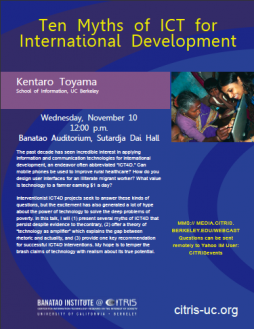



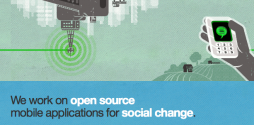
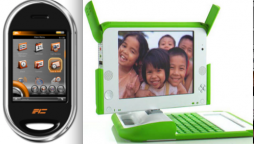
![image[38].png](../../files/imagecache/blogimage/image[38].png)
